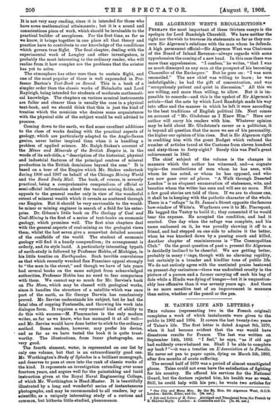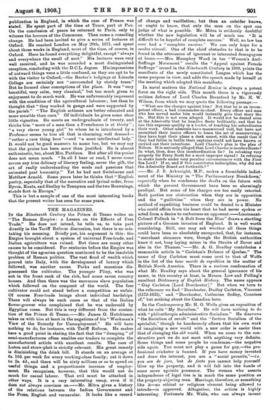H. TAINE'S LIFE AND LETTERS.f
THIS volume (representing two in the French original) completes a work of which instalments were given to the public in 1902 and 1904. It covers the last twenty-two years of Taine's life. The first letter is dated August 9th, 1870, when it had become evident that the war would have disastrous results for France. The last was written on September 14th, 1892. "I feel," he says, "as if old age had suddenly overwhelmed me. Shall I be able to complete my book ? "—it was a treatise on L'Association et la Famine. He never set pen to paper again, dying on March 5th, 1893, after five months of acute suffering.
The second half of 1870 was a period of almost unmitigated gloom. Paine could not even have the satisfaction of fighting for his country. He offered his services for the National Guard, but the doctors rejected him, his health was so weak. Still, he could help with his pen; he wrote two articles for
• One City and Many Men. By the Rt. Hon. Sir Algernon West, G.C.B. London: Smith, Elder, and Co. [6s. net.]
t Life and Letters of H. Taine. Abridged and Translated from the French by E. Sharvel-Rayly. London : A. Constable and Co. [7s. 6d. net.] publication in England, in which the case of France was stated: He spent part of the time at Tours, part at Pau. On the conclusion of peace he returned to Paris, only to witness the horrors of the Commune. Then came a consoling change. He had been invited to give a series of lectures at Oxford. He reached London on May 20th, 1871, and spent about three weeks in England, most of the time, of course, in Oxford. Here he found everything delightful, except "always and everywhere the smell of soot." His lectures were very well received, and he was accorded a most distinguished reception, concluding with the D.C.L. degree. His impressions Of outward things were a little confused, as they are apt to be with the visitor to Oxford,—the Rector's lodgings at Lincoln College are certainly not "surrounded by stately trees." But he formed clear conceptions of the place. It was "very beautiful, very calm, very classical," but too much given to enjoyment to do much work. He was unfavourably impressed with the condition of the agricultural labourer; but then he thought that "they worked in gangs and were supported by the parish." "The English artisans are better educated and more sensible than ours." Of individuals he gives some clear little vignettes. He meets an undergraduate of twenty, and thinks him "more of a man than a Frenchman is at thirty " ; "a very clever young girl" to whom he is introduced by a Professor seems to him all that is charming, well dressed- " rather a rare thing here "—and "a most intellectual lady." It would not he good manners to name her, but we may say that -the praise has been more than justified. He is almost enthusiastic, too, about Mrs. Pattison. But after all the praise does not mean much. "In all I hear or read, I never come across any true delicacy of literary feeling, never the gift, the art of really understanding the souls and passions that animated past humanity." Yet he had met Swinburne and Matthew Arnold. Some years later he thinks that "English poetry, especially that of the narrative and lyrical order, from Byron, Keats, and Shelley to Tennyson and the two Brownings, stands first in Europe."
This is but a sample of one of the most interesting books that-the present writer has seen for some years.



































 Previous page
Previous page